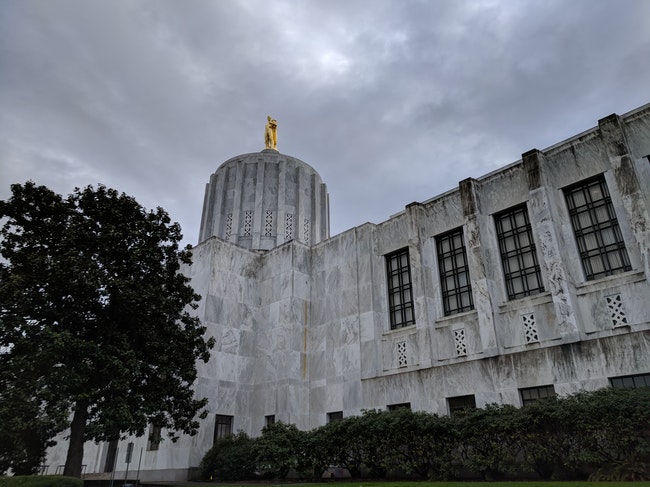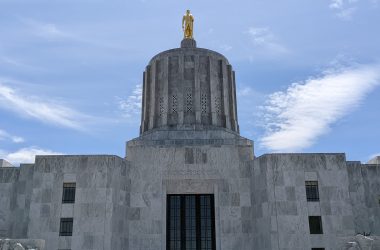 The Oregon Capitol building in Salem. Photo: Chas Hundley
The Oregon Capitol building in Salem. Photo: Chas Hundley
Higher wages for workers and more income for businesses is driving up state tax collections, creating the prospect for even more state government spending and then credits in two years for those paying income taxes, state economists announced Wednesday.
The economists described a robust Oregon economy that they now project will put $1.5 billion more into the state treasury in the current two-year budget cycle than the $23 billion that had been budgeted.
Most of the extra money comes from $763 million more in personal income taxes and $633 million more in corporate income taxes. The higher collections aren’t due to increased tax rates but people and businesses making more taxable income than expected when legislators set the state’s budget for the 2021-2023 cycle.
The report also noted one other source of extra state revenue: Estate taxes. The forecast said those are expected to be $72 million higher.
“Collections in October were the second largest month on record and collections in November were the eighth largest on record,” the forecast said.
Senate President Peter Courtney’s reaction to the news: “Wow.”
Legislators are in session now in Salem and are debating plans for where to spend the extra $1.5 billion by July 2023. They’ll have to decide before the legislature adjourns as required by March 7.
While the Legislature can spend the money now, Oregonians will have to wait to see their share.
Oregonians who pay taxes in 2022 and 2023 will likely receive credits on their income taxes in 2024, as required by a state law that sends money back to taxpayers if tax collections exceed the amount budgeted.
Taxpayers are benefitting from a similar flush budget in 2019-2021. This year, the median taxpayer is getting a credit of about $420. The state economists now expect the state will return $964 million to taxpayers in 2024, though that number could grow or shrink depending on tax collections.
The extra money forecast on Wednesday equals about 6% of the state’s two-year general fund budget of about $25 billion. The state also has other revenue considered outside the general fund, such as federal payments and taxes dedicated to special purposes, such as the corporate activity tax now used to help fund schools.
Oregon political leaders are using the promising forecast to advocate more spending on their own priorities.
“We can build big projects across the state,” Courtney said in a statement. “We can get the homeless off the street. We can do year-round schools. And we can better recruit, train and evaluate police. Much work to do in a very short period.”
 We rely on subscribers to keep the lights on in our little newsroom. Join us with a digital subscription today, $15 off right now for your first year with an annual subscription, or $8/a month. Click here to subscribe.
We rely on subscribers to keep the lights on in our little newsroom. Join us with a digital subscription today, $15 off right now for your first year with an annual subscription, or $8/a month. Click here to subscribe.
House Speaker Dan Rayfield, D-Corvallis, said the Legislature should invest in schools, job training and programs that help Oregonians pay for rent, mortgages and child care. Gov. Kate Brown said the same in her own statement.
“This is a pivotal moment for Oregon,” Brown said. “We have a windfall of one-time resources this year, and we have the opportunity to make big investments – and to do the big and bold work to help our working families and businesses thrive. We cannot miss this moment.”
Senate Republicans, meanwhile, said the extra money is best spent on law enforcement, forest thinning and tax cuts. In a statement, Senate GOP leader Tim Knopp, R-Bend, said his caucus wanted to add $60 million to Oregon State Police budget to investigate illegal marijuana farms and spend $50 million thinning forests to reduce the risk of devastating wildfires.
“We must also be responsible with this money,” Knopp said. “We need to reserve more funds for the next downturn. We also need to look seriously at giving Oregonians a tax break.”
House Republican leader Vikki Breese-Iverson, R-Prineville, didn’t offer her own vision for how to use the additional revenue, instead saying the state shouldn’t have that money in the first place.
“More money for the state is not the same thing as good news for Oregonians,” she said. “People are struggling to make ends meet while the state is swimming in tax revenue.”
The state should “eliminate financial burdens” for people and small businesses, she said, though she didn’t describe specific ways to do that. Her spokesman referred to a brief speech Rep. Lily Morgan, R-Grants Pass, gave on the House floor Tuesday in which she said other states are cutting income taxes and changing how property taxes are assessed, and Oregon should do the same.
Inflation boosts tax collections
State economists Mark McMullen and Josh Lehner explained in a 65-page report what is happening in Oregon’s economy that is driving up state tax collections.
Oregon households are flush with cash, the economists said, though many Oregonians may not feel like it. People who were already wealthy before the pandemic saw the biggest gains over the past few years, and those high-income people are more likely to own real estate or stocks and benefit from them.
Middle-income and low-income Oregonians saw their wages increase – the average wage is up 17% since the start of the pandemic – but they’re losing most of it to inflation. In the past six to 12 months, inflation-adjusted wages actually declined for most workers, the report said.
“For the typical worker, the vast majority of that is getting eaten up in terms of price increases, so their actual well being and standard of living doesn’t increase despite the fact that their incomes are increasing,” McMullen said.
A year ago, he said, most economic forecasters expected inflation would ease as the economy reopened and manufacturers ramped up production of the computer chips needed for a variety of products, including cars. Instead, inflation has continued, and McMullen said more economists believe it could result in the bottom dropping out of the economy after another year of rapid growth.
But that inflation is also helping the corporate world in Oregon, they reported, because consumers continue to buy even as prices increase.
“With underlying demand so strong, businesses have largely been able to pass cost increases along to their customers,” the forecast said. “Profits and earnings have skyrocketed.”
But they cautioned that the economy could be headed for a boom/bust scenario in which people would lose their jobs and investors and governments would lose money.
“Inflationary booms of the sort we are experiencing today traditionally do not end well, putting recent revenue gains at risk going forward,” the report said.
High costs could slow population growth
The state’s population growth slowed in 2020 and 2021, but economists expect it to pick up again this year. In one early indication, more people are surrendering out-of-state driver’s licenses to the Department of Motor Vehicles this year than last.
The economic forecast predicts Oregon adding about 30,000 residents annually, about half the number the state saw in 2017, 2018 and the years immediately preceding the Great Depression. Meanwhile, the economists expect Oregon to add about 22,000 new homes per year in the next decade, enough to keep pace with the population growth but not enough to make up for the current shortfall of 110,000 homes.
That means high rent and home prices will continue, and the cost of living in Oregon could deter people from moving to the state or cause current residents to leave. Long-term, slower population growth means fewer workers and less tax revenue for state and local governments.
“To the extent that housing affordability repels migrants from Oregon, like it has from California, then our office’s longer term forecast, the 10-year forecast for the economy and state revenues would all be revised downward because we’d have a smaller slower growing economy than we’re currently seeing,” Lehner said.
This story originally appeared in the Oregon Capital Chronicle and is republished here under a CC BY-NC-ND 4.0 license. Read more stories at oregoncapitalchronicle.com.






